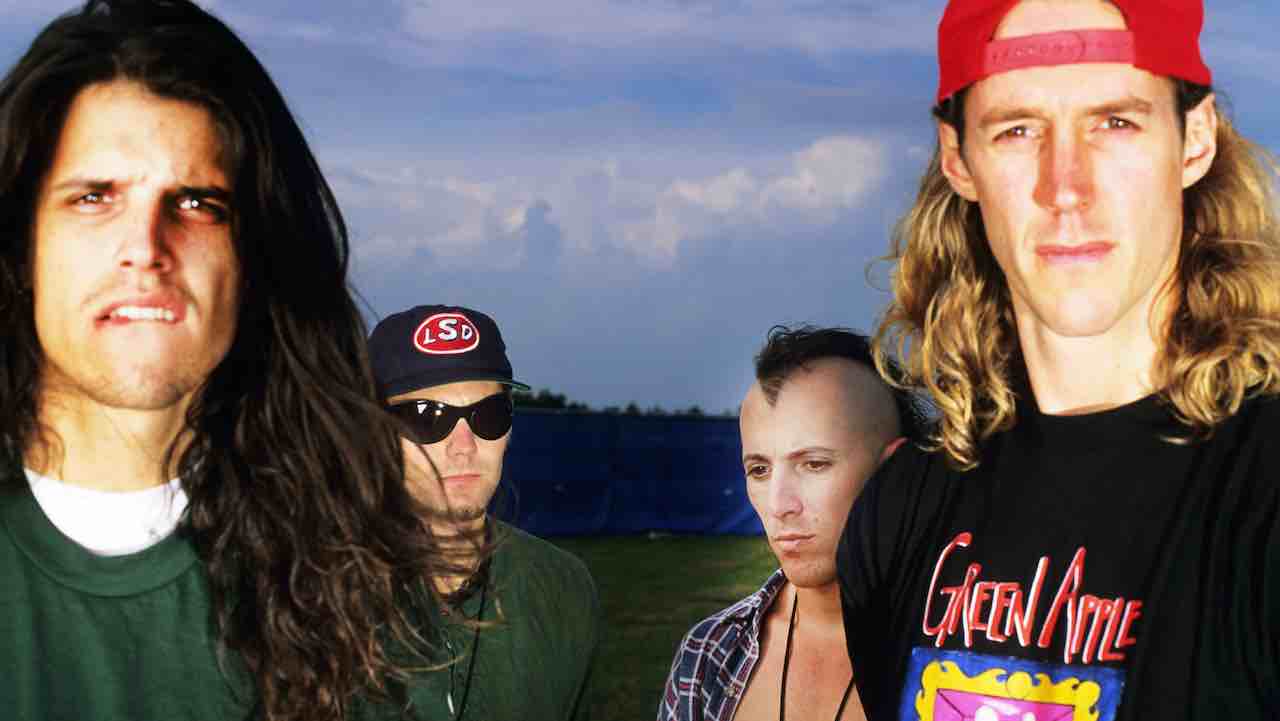
The releases of Metallica’s Black Album and Nirvana’s Nevermind decimated the Western alt-music landscape like a nuclear bomb in 1991. In the wake of those two chart-dominating albums, the traditional values of hard rock (bravado, anger and ever-intensifying music) were deemed passé, and groove and vulnerability became the genre’s new must-hear sounds. It’s this context that helped give rise to one of the greatest bands in progressive metal: Tool.
Tool could not have been further removed from the glam dickswinging or thrash fury that dominated the 1980s. Instead, on their 1993 debut Undertow, the Californian quartet mixed an introspective, mid-paced and cerebral alt-metal cocktail. The album’s first single, Sober, condensed that thinking man’s angst into a tight, anthemic form. Buoyed by drummer Danny Carey, guitarist Adam Jones and bassist Paul D’Amour’s technical precision and frontman Maynard James Keenan’s immaculate wails, it lifted Tool to chart success and started their climb to arena-cramming supremacy.
Sober, as a song, outlives Tool as a band. Although Carey, Jones, D’Amour and Keenan didn’t first congregate until 1990, parts of their future hit were first heard three years prior. The verse melody and some of the lyrics (including the scathingly cathartic ‘Jesus won’t you fucking whistle, something but the past is done?!’) date back to Keenan’s prior band Children Of The Anachronistic Dynasty and their song Burn About Out. The five-piece didn’t go far, their greatest achievement being a set on local TV in Grand Rapids, Michigan: the half-hour has since become infamous thanks to Keenan’s glorious mullet and one incredibly awkward interview.
Nonetheless, Keenan deemed elements of Burn About Out promising enough to carry them with him into Tool. The song’s best bits were quickly rejigged by the new band and appeared in their current, far more famous form for the first time on 1991’s 72826. The demo slowed the pace of the original vocal melody and, most importantly, added one hell of a chorus to tie the track together. ‘Whyyyyyyyy can’t we not be sober?!’ Maynard howls with both passion and prowess. ‘I just want to start this over!’
With that immense hook and the song’s new title, it became obvious that addiction was a key theme of Sober’s lyrics. Jones confirmed as much in a rare interview with Guitar School in March 1994.
“The song and video are based on a guy we know who is at his artistic best when he’s loaded,” the guitarist explained. “A lot of people give him shit for that. I don’t tell people to do or not do drugs. You can do what you want, but you have to take responsibility for what happens. If you become addicted and a junkie, well, that’s your fault.”
The 72826 demo got Tool signed to Zoo Entertainment. After the band released their debut EP, Opiate, through the L.A. label in 1992, they quickly began work on Undertow. Sober was revived and glossed-up for the debut yet, compositionally, went virtually untouched. It then came out as Undertow’s lead single in the spring of 1993.
Both Undertow and Sober quickly became commercial successes. The underground goodwill cultivated by Opiate was consolidated when Tool’s debut album reached number one on the US Heatseekers chart, then the single ascended to number three on the country’s singles chart.
The Sober video, directed by Jones, also became a hit on MTV. The guitarist had previously worked as a special effects artist and set designer on a number of Hollywood blockbusters, including Batman Returns and Jurassic Park. He made use of those vocations for Sober’s clip, masterminding a visceral stop-motion film, which proved a standout amid all the live-action alt-rock videos otherwise being broadcast.
For the video, Jones tapped into his love of stop-motion animators the Brothers Quay. The dank environment and surrealist imagery were both incredibly similar to the directors’ works, to the point that fellow rock musician and Brothers Quay admirer Kurt Cobain called Tool out. (Nirvana had previously wanted the siblings to direct their Lithium video, but they declined.)
Cobain didn’t mince any words about the perceived infringement in a 1993 MTV interview. “Oh God, I hope they [Tool] get sued,” he said. “It is such a ripoff, it’s a shameless ripoff. I wanted a Brothers Quay style, but I didn’t want anything like that. It’s a neat video, it’s really nice to look at, but I’d rather watch a Brothers Quay video. Meat going through pipes, shameless! They should be slapped on the wrist for that.”
Tool did not get sued, however. Instead, Sober’s video has entered the hall of fame of freaky heavy metal clips, and the band were apparently so pleased with Jones’ animation (plus his design for Undertow’s album cover) that he’s remained their art director.
As for the single, Sober has persisted as one of Tool’s most accessible and successful moments. It’s been streamed upwards of 110 million times since the band joined Spotify in August 2019, making it their third-most listened-to song. And – although Tool have since flourished into far more expansive, progressive music – Sober still penetrates their setlists to this day. One of rock’s greatest figureheads may have lambasted the video as a ripoff, but no one can deny that Sober started Tool’s journey into being one of the most original and adored forces in heavy music.








